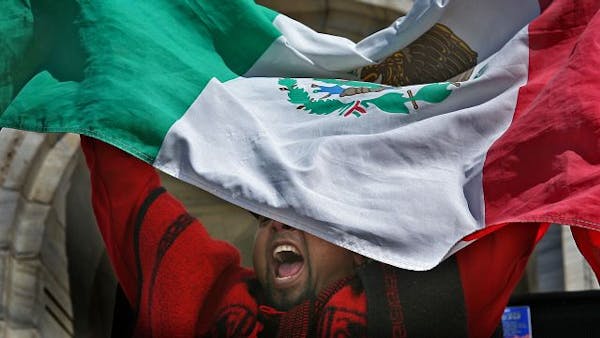The economy of Mexico — the Minnesota International Center's 2014 focus country — has been transformed in recent decades, becoming formidable enough to be dubbed by some an "Aztec tiger." Nothing did more to energize that evolution than the passage of the North American Free Trade Agreement (NAFTA) 20 years ago.
NAFTA's passage, in turn, was made possible by a single, seminal event: a November 1993 debate between then-Vice President Al Gore and former presidential candidate Ross Perot. Their freewheeling exchange over free trade, moderated by CNN's Larry King, was viewed by an astonishing 16 million-plus people, then a record rating for cable TV.
There were several reasons the masses tuned in to a free-trade debate.
One, the issue fundamentally wasn't about trade, but about jobs, something more relevant to most than arcane abstractions like trade tariffs.
But political personalities mattered, too.
Perot, the prickly but folksy billionaire businessman who nabbed 19 percent of the vote in the 1992 presidential campaign, was a staunch NAFTA opponent — and more of a showman than a politician. Gore, who presented then-President Bill Clinton's pro-NAFTA argument, was considered at the time a smooth, dynamic debater — an image he later lost after his stilted style hindered his bid for the top spot in 2000.
The NAFTA debate wasn't just watched in living rooms. It was followed in the halls of Congress, too.
"It's very difficult to tie any public communicative event to a vote," said Kathleen Hall Jamieson, director of the Annenberg Public Policy Center at the University of Pennsylvania. But Gore's forceful performance mattered.
"It was not a terribly popular vote for Democrats to be casting. But the fact that Al Gore did well in that debate was a very important signal that there were arguments available to defend that vote," Jamieson said.
And it wasn't just households but casas paying attention. The debate was front-page news in Mexico, said Tim Kehoe, a University of Minnesota economics professor and adviser to the Federal Reserve Bank of Minneapolis. Kehoe, who advised the Mexican government on the impact of joining NAFTA, said the focus in Mexico was less on Gore than on his sparring partner.
"Ross Perot's language and attitude and talk of a 'giant sucking sound' [as U.S. jobs went south] really antagonized the average Mexican," Kehoe said, adding that some perceived Perot as a racist.
NAFTA's passage has resulted in a Mexican trade-to-GDP ratio above 60 percent — higher than the United States, Brazil and even China, Shannon K. O'Neil, a senior fellow at the Council on Foreign Relations, wrote in the current issue of Foreign Affairs magazine. Mexico, along with the United States and 10 other countries, hopes that the proposed Trans-Pacific Partnership (TPP) goes beyond NAFTA in advancing economic growth.
Indeed, the TPP's scope could transform trade even more than NAFTA did. And yet the debate over it seems more C-SPAN than CNN, because Americans aren't nearly as plugged in to TPP as they were to NAFTA.
Part of the reason is that star-power politicians haven't made the issue their own. Sure, there are compelling politicians today who seize screens (although Chris Christie probably wouldn't mind less camera glare about now). But few are fighting for, or against, the TPP.
"Are we going to have a national [TPP] debate on television that would have the same kind of viewership?" asked Jamieson. "No. Because there aren't people embodying positions in this debate that the public wants to watch."
This doesn't mean that the media isn't having an impact. But it's not CNN, which characterized new media in 1993, but one of today's new-media disrupters, WikiLeaks.
Three WikiLeaks releases of proposed TPP terms have galvanized treaty opposition among those concerned about intellectual property rights, environmental protection and more. The leaks have inspired pushback that in turn has pushed back the pact's negotiations beyond the stated goal of last December.
"Any time a document that is labeled 'secret' is released, its credibility is high because the public is eager to determine motivation for the position that individuals are taking," Jamieson said, adding that some are "eager to see the underside of a debate by looking at private sources."
Yet no negotiations can succeed in such an environment, said Kehoe, who thinks the WikiLeaks releases could have "a horrible effect."
"If you don't want the U.S. to negotiate with foreign governments, this would ensure that," Kehoe said. But, he added, leaks work both ways. They could derail agreements favored by environmentalists, too.
Beyond the resistance of specific interest groups, winning congressional approval for "fast-track" authority on TPP, as well as on the proposed Transatlantic Trade and Investment Partnership between the European Union and the United States, is an uphill Capitol Hill battle — just like most administration initiatives.
Meanwhile, in Mexico, there is a much more optimistic perspective on TPP than in the United States, Kehoe said. And it's not just Mexico. Chile's and Peru's Pacific societies seem more sanguine about the pact's impact, too, Kehoe added.
Trade is indeed about jobs. So it's ultimately about people. An informed, constructive and maximally transparent debate should command attention this time, too, even if there aren't compelling personalities or new-media methods to break through the news narrative.
John Rash is a Star Tribune editorial writer and columnist. The Rash Report can be heard at 8:20 a.m. on Friday on WCCO Radio, 830-AM. On Twitter: @rashreport.
The Star Tribune Editorial Board and the Minnesota International Center are partners in " Great Decisions," a monthly dialogue discussing foreign-policy topics. Want to join the conversation? Go to www.micglobe.org.

Film festival shows the transformative power of art
NATO's strength in numbers makes U.S. more secure


